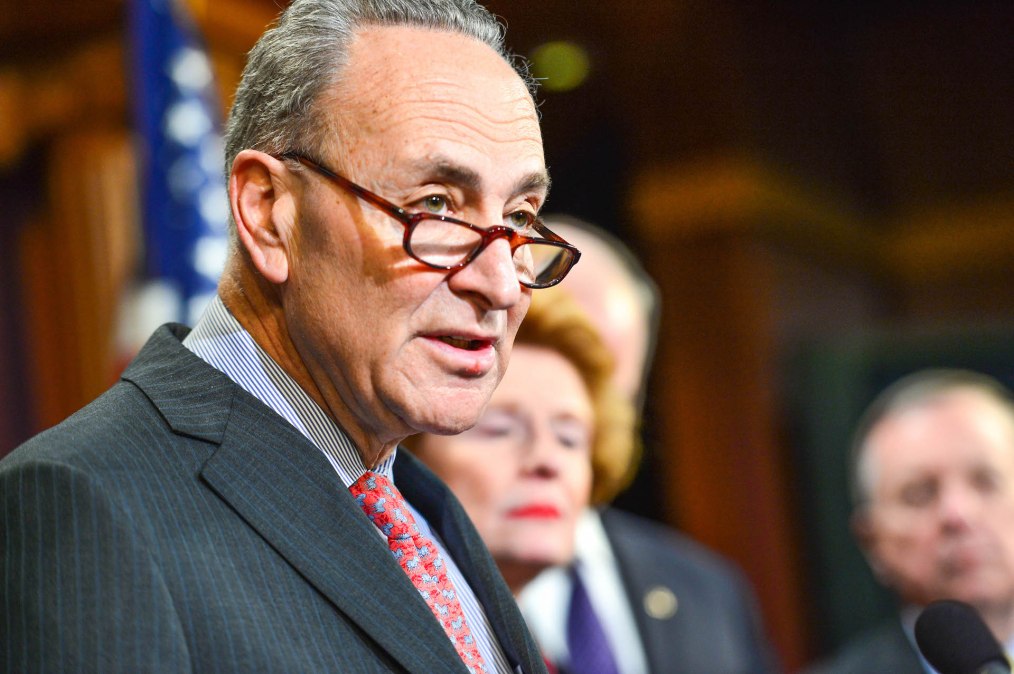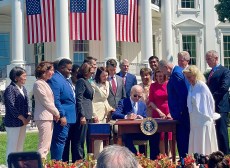NSF would rebrand, wield $100B for strategic tech research under Schumer bill

This story has been updated to reflect the proposal’s release and a potential avenue for its passage.
The National Science Foundation would receive $100 billion over five years to research areas like artificial intelligence, quantum computing and 5G wireless, under a bipartisan proposal the Senate’s top Democrat released Wednesday.
The Endless Frontier Act, sponsored by Minority Leader Chuck Schumer, proposes rebranding the agency as the National Science and Technology Foundation and appointing a second deputy director to oversee research funding in areas of global strategic importance.
Currently the NSF receives $8.1 billion annually — a budget no longer tenable as U.S. leadership in scientific research has “eroded,” Schumer‘s office says.
“The coronavirus pandemic has shown the science and technology gap between the United States and the rest of the world is closing fast and that threatens our long-term health, economic competitiveness, and national security,” Schumer, who represents New York, said in the announcement.
“[O]ur foreign competitors, some of whom are stealing American intellectual property and trade secrets, are aggressively investing in fundamental research, and commercialization, to dominate the key technology fields of the future,” reads a fact sheet released by Schumer and fellow bill supporters. Sen. Todd Young, R-Ind., and Reps. Ro Khanna, D-Calif., and Mike Gallagher, R-Wis. all cited China as the primary threat to U.S. “technological superiority” in their corresponding statements.
‘DARPA-like authorities’
Schumer’s bill would have one deputy director run existing NSF operations and the other manage a new Technology Directorate with “DARPA-like authorities” to award funds along with “flexible” personnel and program managers. When Schumer floated a possible bill in November, the idea was for NSF and the Defense Advanced Research Projects Agency to coordinate AI investments.
Instead the Technology Directorate will advise the deputy director in 10, periodically refreshed focus areas:
- AI and machine learning
- High-performance computing, semiconductors and advanced computer hardware
- Quantum computing and information systems
- Robotics, automation and advanced manufacturing
- Natural or anthropogenic disaster prevention
- Advanced communications technology
- Biotechnology, genomics and synthetic biology
- Advanced energy technology
- Cybersecurity, data storage and data management technologies
- Materials science and engineering
The bill would authorize an additional $10 billion over five years for the Department of Commerce to designate 10 to 15 regional technology hubs for investment initiatives. The Technology Directorate would coordinate with the department and other agencies to develop those hubs and connect disadvantaged populations.
Funds under the directorate’s purview won’t be limited to NSF research but that of other agencies, as well. Authorized activities creating research centers and consortia at universities; funding scholarships, training programs, fellowships and post-doctoral support; developing test beds and fabrication facilities; establishing programs boosting access to investment capital; building regional innovation ecosystems with state and local governments; and collaborating with allies and international organizations.
The upcoming National Defense Authorization Act may be a good vehicle to move the legislation, according to a senior aid familiar with the members’ plans.
“Instead of allowing Beijing to threaten our values and interests, now is the time for America to invest in ourselves and give the world a clear alternative,” Young said in a statement. “America’s history is filled with bold initiatives and calculated investments that have harnessed America’s ability to collaborate across the public and private sectors.”




